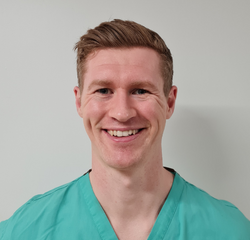
As Healthcare Science Week draws to a close for 2022, Dr Gavin McClean, Trainee Echocardiographer at Barts Health NHS Trust, explores why a career in cardiac healthcare science might be the right choice for those considering their career options.
Why pursue a career in cardiac healthcare science?
Before considering how let us first consider why, with some personal insights. After all, you’re about to embark upon an exciting career journey. From an early stage in my aspirations to be a cardiac healthcare scientist, echocardiography has been my passion. The ability to obtain real-time images of the heart with just a probe in hand and some ultrasound gel... to put it simply… amazed me! Better still, I was being inspired by one of the finest echocardiographers around, Dr David Oxborough, during my undergraduate in sport and exercise science and PhD in the paediatic athletes heart.
Cardiac healthcare science, however, is not limited to echocardiography. We use a vast array of diagnostics in our assessment of patients. Including, but not limited to 12-lead-ECGs, ambulatory monitoring, exercise tolerance tests, device implantation, and follow-up. With opportunities to progress and specialise in more advanced diagnostics as you grow and develop. Collectively, as cardiac healthcare scientists/physiologists, we aim to directly improve patient care through the application of evidence-based practice in diagnostic, monitoring, and analytical procedures for patients.
Challenges as a trainee healthcare scientist?
Now that I’ve got your attention, it’s important to remember that all that glitters is not gold. So, let’s take a look at some of the challenges that you may face as you aspire to become a cardiac healthcare scientist/physiologist.
On a personal level, the competing demands of full-time employment together with part-time postgraduate education outstretch the normal working week as an echocardiography trainee. Often requiring hours spent in the mornings/evenings prior to/after work and/or weekends completing university assignments, studying, writing up competencies and the list goes on. Experiences that are shared by all trainees across all levels and disciplines of healthcare science who are undertaking training programs with Health Education England. Whilst this might seem gloomy, I’m willing to bet that if you were to ask a trainee if they think it’s worth it, the answer is likely to be a resounding, yes!
How can you make the jump?
You’re in luck. There is an increasing number of options available for you to begin your journey in cardiac healthcare science. Traditionally, these have taken the form of the Practitioner Training Programme, and the Scientist Training Programme, available at an undergraduate and postgraduate level, respectively. Both necessitating 3 years of part-time study, together with full-time employment. If there was a ‘silver lining’ of COVID-19, it has been the showcasing of the important role of healthcare scientists. Whilst representing only 5% of the workforce, we underpin 80% of all diagnostics, clinical decisions, together with driving implementation and innovation of novel techniques and technologies across all areas of healthcare science. Subsequently, this has translated to the increasing emergence of healthcare science apprenticeships and the new and ever-expanding 18-month Echocardiography Training Programme; established to facilitate a faster response to the urgent national workforce shortage of accredited echocardiographers.
3 tips to a successful application
Competition, however, for such opportunities is understandably high, so here are 3 tips to making a successful application:
- Obtain work experience: Reach out to your local trust explaining that you’re considering a career in cardiac healthcare science and I’m sure they’ll gladly welcome you to a day of observation when possible. Such experience will be invaluable in gaining an understanding of the role of cardiac healthcare scientists beyond your textbooks or YouTube.
- Get involved in a cardiac research project: As healthcare scientists, we apply evidence-based practice to conducting, analysing, and reporting of a range of diagnostic investigations every day. Obtaining an understanding of how such research is undertaken, will aid your ability to appraise and apply such research as a cardiac healthcare scientist.
- Obtain an entry-level role, such as healthcare assistant: This represents a fantastic opportunity to develop your patient-facing skills, for a role in which you will always put the patient first.
Advancing roles as a cardiac healthcare scientist
The NHS has recognised the need to think differently when it comes to the recovery and renewal of its diagnostic services following COVID-19. Enabling healthcare scientists to work across traditional boundaries and at the ‘top of their licence’1,2. Indeed, healthcare scientist-led services have been demonstrated to reduce waiting lists, improve turnaround times, improve service user experiences, and most importantly to be safe3–5. The success of such investigations has translated to the establishment of permanent echocardiographer-led valve clinics6, fellowships for Healthcare Science Innovators, and more roles beyond the scope of this blog.
Summary
Healthcare science week is an annual week of celebration and awareness-raising for the many careers in healthcare science. I hope that I’ve been able to shine a light on the exciting pathways within cardiac healthcare science has on offer to you.
References
- Richards M. Diagnostics: Recovery and Renewal. 2020. [Accessed 17/03/2022]
- Department of Health. The NHS People Plan. 2020. [Accessed 17/03/2022]
- Stain N, Ross C, Leitch M. The development of allied professions-led cardiac clinics. Eur J Cardiovasc Nurs 2020; S1–68.
- Stain N, Chauhan M, Bayne S, et al. Establishing a non-medically led same day electrocardiogram reporting and recommendation service. EP Eur 2019; 21: ii779–ii787.
- Sampson M, Lovegrove A, Gillam L. Changing practice: A nurse and physiologist-led tilt-testing service. Br J Card Nurs 2010; 5: 180–187.
- Taggu W, Topham A, Hart L, et al. A cardiac sonographer led follow up clinic for heart valve disease. Int J Cardiol 2009; 132: 240–243.